The seventh World Peace Forum (WPF) opened at Tsinghua University on July 14, with the theme of “Constructing a Security Community: Equality, Equity and Justice”. Yang Jiechi, member of the Political Bureau of the Communist Party of China (CPC) Central Committee, and Director of the Office of the Central Commission for Foreign Affairs, addressed the opening ceremony.
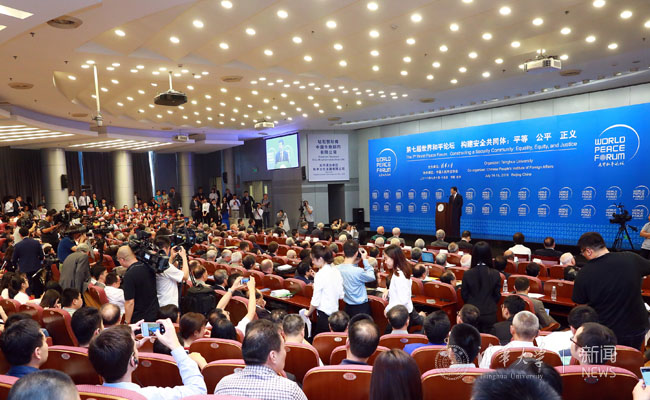
The forum was attended by former Afghanistan president Hamid Karzai, former President of the European Council Herman Van Rompuy, former President of the European Commission Jose Manuel Barroso, former Minister of Foreign Affairs of Iran Seyed Ali Naghi Kharrazi, former Foreign Minister of Egypt Nabil Fahmy, , former Foreign Secretary of Pakistan Riaz Khokhar, former Minister for Foreign Affairs of Japan Yoriko Kawaguchi, former Minister for Foreign Affairs of Australia Gareth Evans, former Minister of Foreign Affairs and Trade of South Korea Kim Sung-Hwan, former Prime Minister of Pakistan Shaukat Aziz, former Foreign Secretary of India Shyam Saran, the Vice Minister of Ministry of Foreign Affairs of China Le Yucheng, the Vice Chairperson of the Foreign Affairs Committee of the National People’s Congress of China Fu Ying, the former Vice Minister of the Ministry of Foreign Affairs of China He Yafei and other former politicians and opinion leaders from around the world. Diplomatic envoys from more than 40 countries attended the opening ceremony. 70 think tank scholars from 23 countries spoke at the forum, and 270 researchers and practitioners in the field of international relations were present at the event. The President of the Chinese People’s Institute of Foreign Affairs Wu Hailong, the former President of the China International Institute for Strategic Studies Xiong Guangkai, the Chairperson of Tsinghua University Council Chen Xu, and the Vice President of Tsinghua University Yang Bin also attended the forum. Yan Xuetong, the Secretary General of World Peace Forum, moderated the opening ceremony.
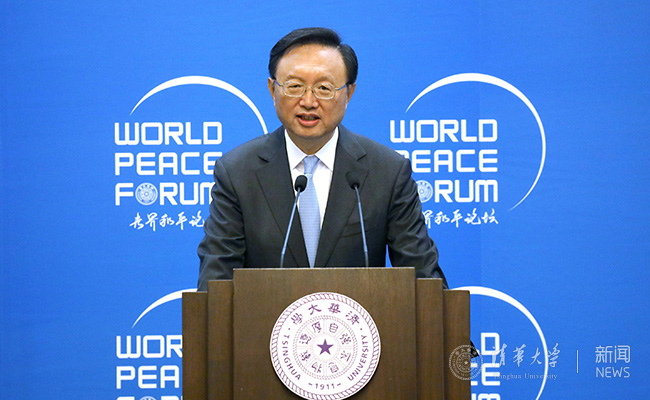
In his opening address, Yang Jiechi congratulated the assembled guests on the opening of this year’s forum. He pointed out that the ever-changing international environment is reshaping the security landscape in profound ways: security issues have become more interconnected, more contagious and more perilous. To ensure lasting peace amidst these profound security shifts, he suggested five principles to be followed in handling international security issues: first, equality and mutual trust; second, cooperation for mutual benefit; third, equity and justice; fourth, reform and innovation; fifth, sustainable development.
“It will take the concerted efforts of all countries to make the bright prospects a reality. Let me say that we will work with all other countries, for a world of lasting peace and universal security, for a community with a shared future for mankind, and for greater progress in the lofty cause of world peace,” he said.
He also commended Tsinghua for what it has done to facilitate mutual understanding and friendship among young people from around the world and to promote friendship and cooperation between China and the rest of the world.
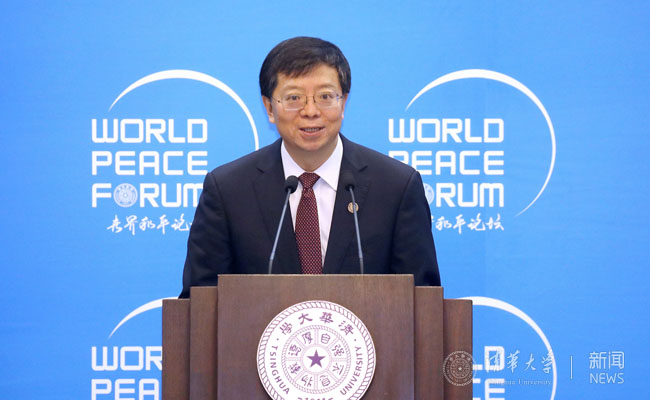
In his welcome speech at the opening ceremony, Qiu Yong, President of Tsinghua University, and Chairman of World Peace Forum, extended his warmest welcome and thanks to all the participants on behalf of Tsinghua University and announced the opening of the seventh world peace forum.
“The World Peace Forum is an Asia-based global forum on international security. It has always adhered to the principles of innovation, openness, inclusiveness, and is forward-looking, and it provides a good platform for participating guests to communicate and interact, and strive to add momentum to the sound development of international security cooperation in theory and practice”, said President Qiu.
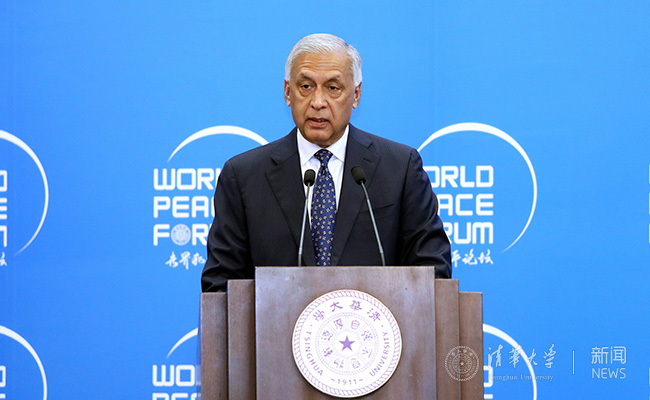
Former Prime Minister of Pakistan Shaukat Aziz and former President of the European Council Herman Van Rompuy spoke at the first plenary with the theme “Trends in Global Order”.
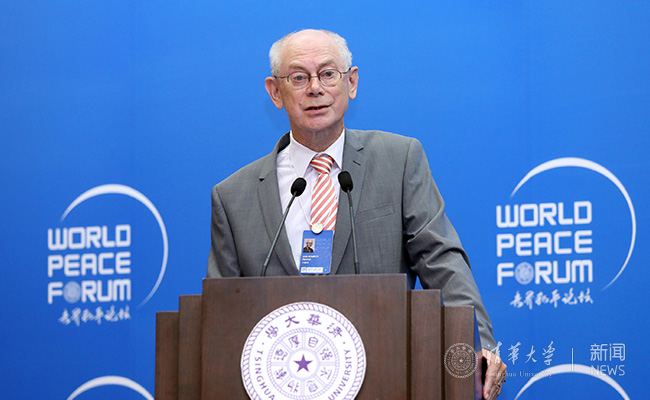
During the two-day forum, current solutions to the security challenges faced by the international community will be discussed. Besides topics such as anti-terrorism and anti-nuclear proliferation, security issues, including trade conflicts and economic security, AI technology and its impact on international relation, are also on the agenda this year.
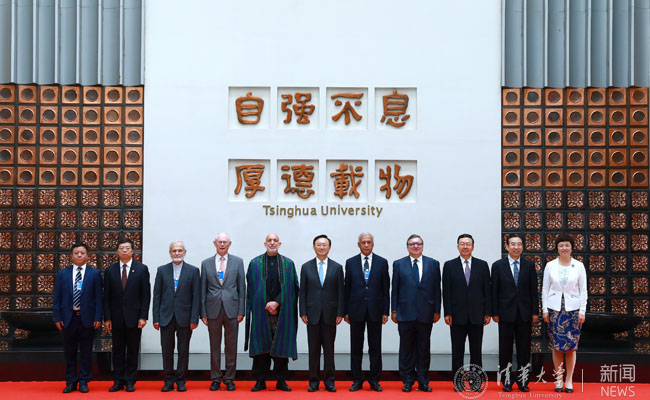
The forum will have two plenaries with discussion sessions, two lunch meetings and 26 panels, covering international and regional issues as well as other relevant topics.
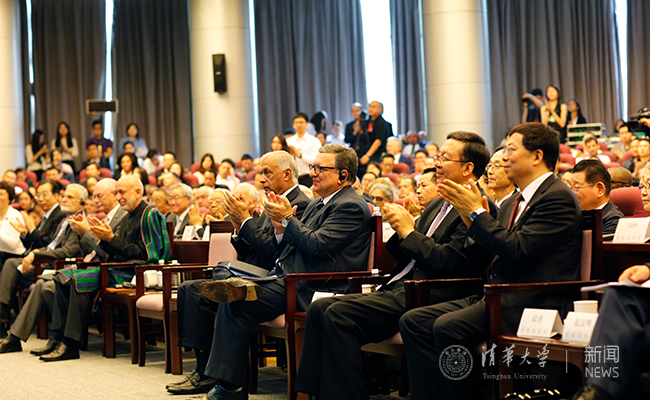
The World Peace Forum, organized by Tsinghua University and co-organized by the Chinese People’s Institute of Foreign Affairs, is a high-level non-governmental global forum on international security held under the approval of the State Council.
Writer: Guo Lili

